As technology continues to expand globally, the demand for skilled app and software developers is higher than ever.
However, finding and retaining qualified employees can be a challenge, especially for individuals who need a helping hand with their tech projects. When it comes to hiring software developers, the abundance of options can lead to confusion in selecting the ideal choice.
As per recent statistics- in 2021, the global count of software developers was 25,6 million, and it is anticipated to escalate to 28.7 million people by 2024.
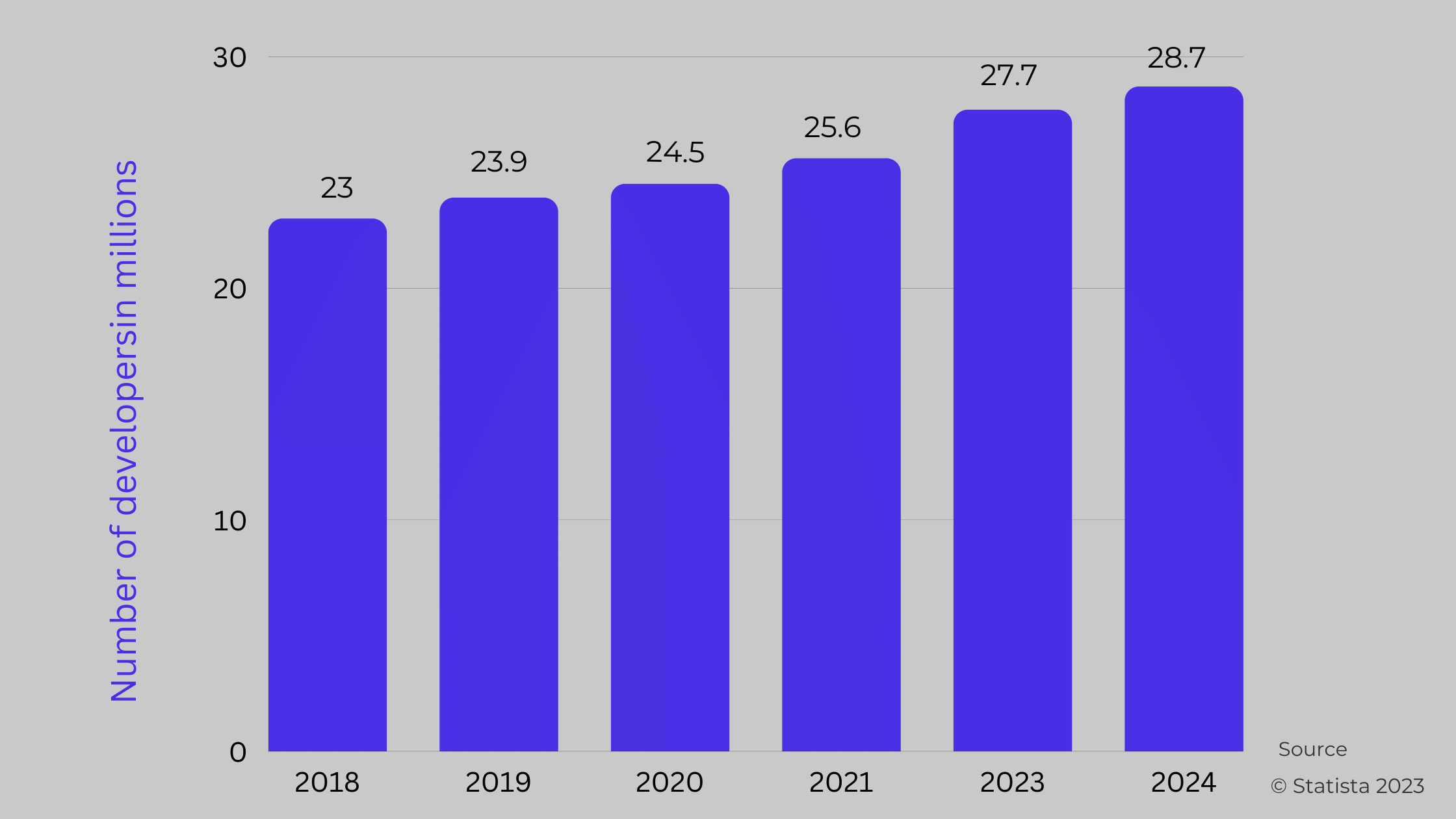 Image Source
Image Source
Moreover, sometimes, internal development teams may not possess the necessary resources or expertise required to successfully finish a project within the designated time and financial constraints.
This is where on-demand developers for hire, remote software developers, and outsourcing firms come in to offer their assistance.
This guide is to help into the complexities of hiring on-demand developers for your project. We shall begin by understanding on-demand developers- who they are, their multifaceted roles, and why they are crucial to the success of your ventures.
Introduction To On-demand Developers
The concept of on-demand developers essentially refers to developers who are engaged by companies to perform their work on an as-needed basis. They are not in-house developers. Instead, these developers are a part of:
- Outsourcing firms that allow vendors to hire their resources
- IT staff augmentation companies who act as a bridge between the vendor and the developers
- And, even freelancers.
Despite the various designations, on-demand developers for hire share a common trait that they work on a project-based. They bring an added dimension of agility and dynamism to the table. Also, the nature of their work environment is remote. They work from remote locations, in a similar fashion as how freelancers do.
Advantages of Hiring On-Demand Developers
The paradigm of the work environment is undergoing a tectonic transformation, especially after the COVID-19 outbreak. As per World Economic Forum’s report, remote work is one such shift that is gaining momentum and will be the future of work.
In a survey, it has found that around 91.0% of employees showed satisfaction with working from home, considering responses satisfied and very satisfied.
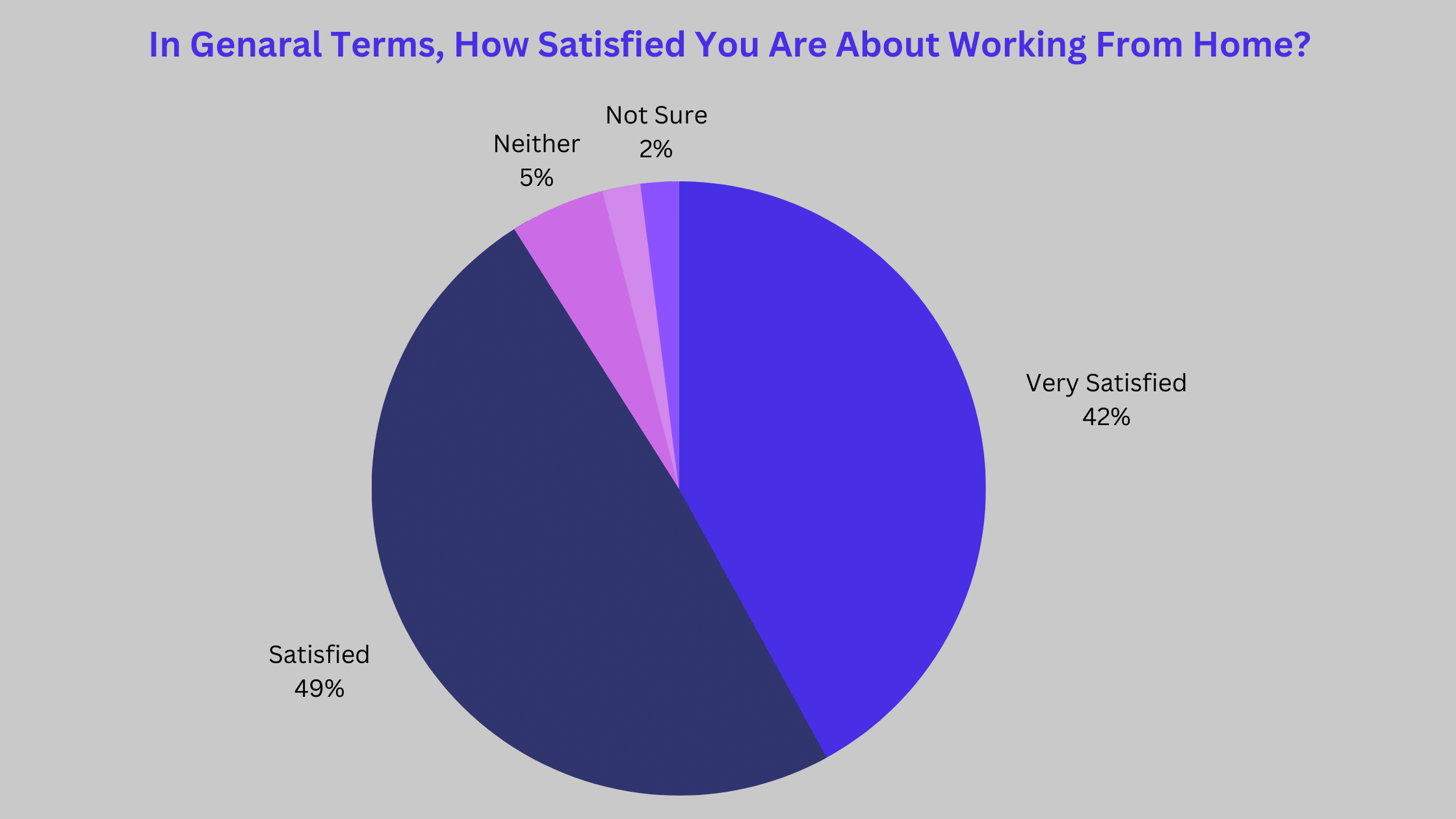 Furthermore, the technology-driven advancements in the way people work are making the transformation even more expeditious.
Furthermore, the technology-driven advancements in the way people work are making the transformation even more expeditious.
It is of paramount importance for companies to observe and comprehend these alterations to keep up with the ever-evolving demands and preferences of their workforce.
One of the strategies employed to address technology-driven changes in the workplace is to partner with or hire on-demand developers.
But what advantages do business owners stand to gain by hiring on-demand developers?
By leveraging the expertise of an on-demand developer, you can reduce the risk of project delays or failure, and achieve success with your software development project. If we take a closer look, there are several significant benefits to opting to hire on-demand developers. By examining the benefits associated with this decision, let us discover its true value.
- Staying up-to-date with technologies:
The technology industry is constantly evolving, making it imperative to secure a developer who is adept at learning the latest trends and tools. Furthermore, you need on-demand developers for hire who can bring an innovative approach and fresh ideas to the table.
On-demand developers are constantly being introduced to the latest technologies and trends due to their work on a variety of projects for a diverse range of clients. Thus, making them the epitome of proficiency in this ever-changing domain.
- High-Quality Work:
On-demand developers are typically vetted professionals who have been thoroughly screened and trained in their respective fields. Relying on the skills of an on-demand developer for your endeavor provides peace of mind that your efforts will be of superior quality.
- High Productivity Level:
On-demand developers are motivated by the need to produce high-quality work and impress their clients. This translates into a high level of productivity, as they strive to meet tight deadlines and exceed expectations.
- Flexibility:
The best thing about on-demand developers for hire, you can easily scale your team up or down depending on your project needs. You can add new members when your workload increases, and release them when you no longer need their services.
- Cost-Effective Solutions
When you hire developers on-demand, you can avoid concerns about expenses that come with maintaining an office space, equipment, and insurance.
This leads to business owners saving a significant amount of money. Besides, they can also focus on their project without any extra distractions.
- Complete Control Over the Project:
You can have complete control over the development process and manage the project according to your requirements when you hire on-demand developers. You can set deadlines, establish milestones, and make changes as needed.
- Faster project completion:
An agile team of on-demand developers can achieve quicker completion of your project rather than hiring a full-time team.
- Ideal for short-term projects:
If a project is short-term, an on-demand developer for hire is an excellent option due to their availability to work temporarily and being able to be released when the project is finished.
Types of On-Demand Developers
A whopping 76% of executives surveyed by Deloitte have confirmed that their IT services are being delivered via third-party models. But here’s the kicker: cost efficiencies are no longer the main priority.
Nowadays, there is a greater emphasis on generating value from external service providers, which has accelerated the trend towards outsourcing IT functions.
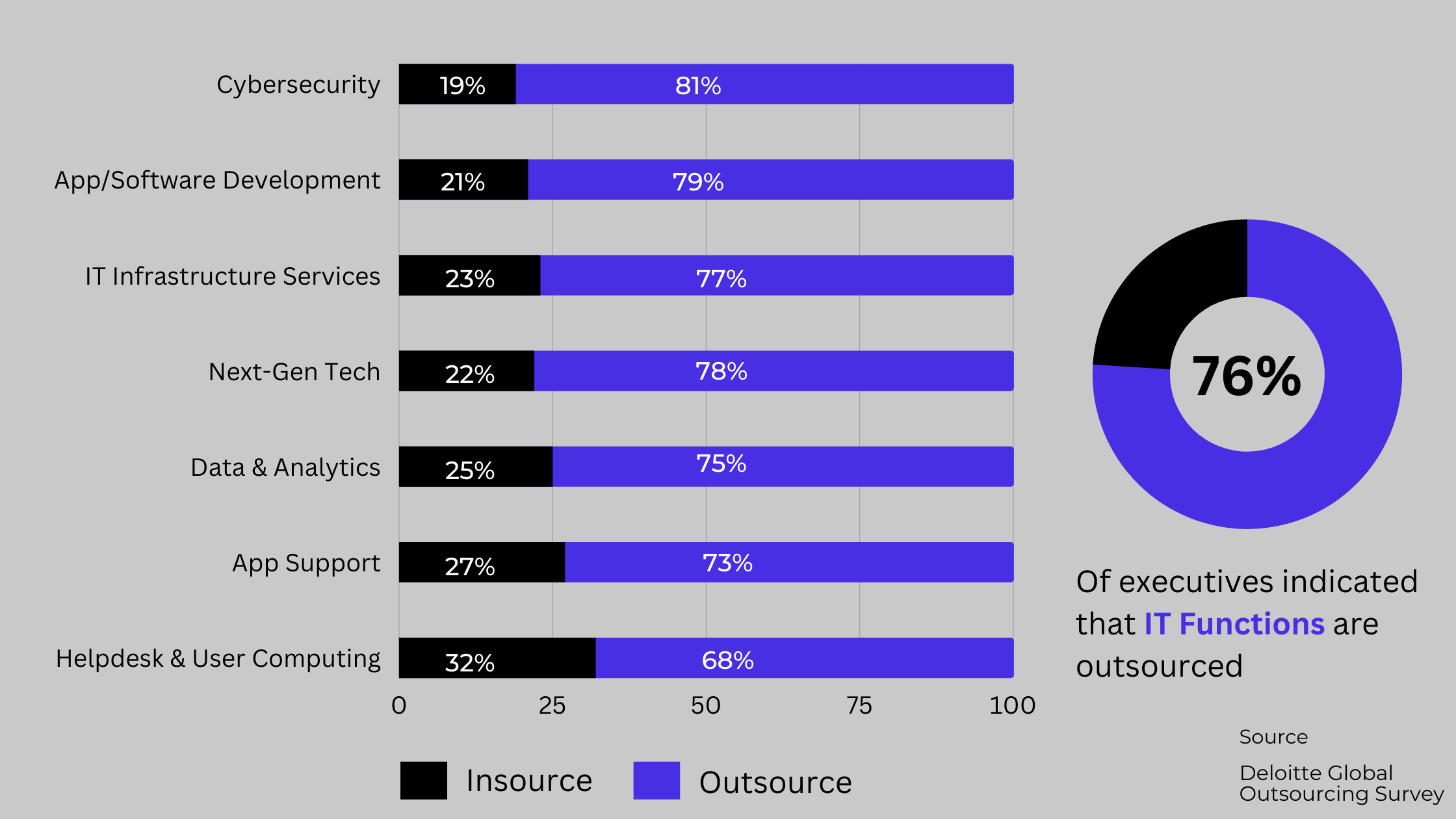 While outsourcing IT functions is becoming a common practice in the industry, the hiring of on-demand developers is also gaining popularity. Furthermore, today, business leaders have different options for hiring on-demand developers.
While outsourcing IT functions is becoming a common practice in the industry, the hiring of on-demand developers is also gaining popularity. Furthermore, today, business leaders have different options for hiring on-demand developers.
The three most common types of on-demand developers for hire: nearshore, offshore, and onshore. Choosing the suitable type relies on the particular requirements of the project and financial capacity, given that each type has its own advantages and disadvantages.
- Nearshore Developers
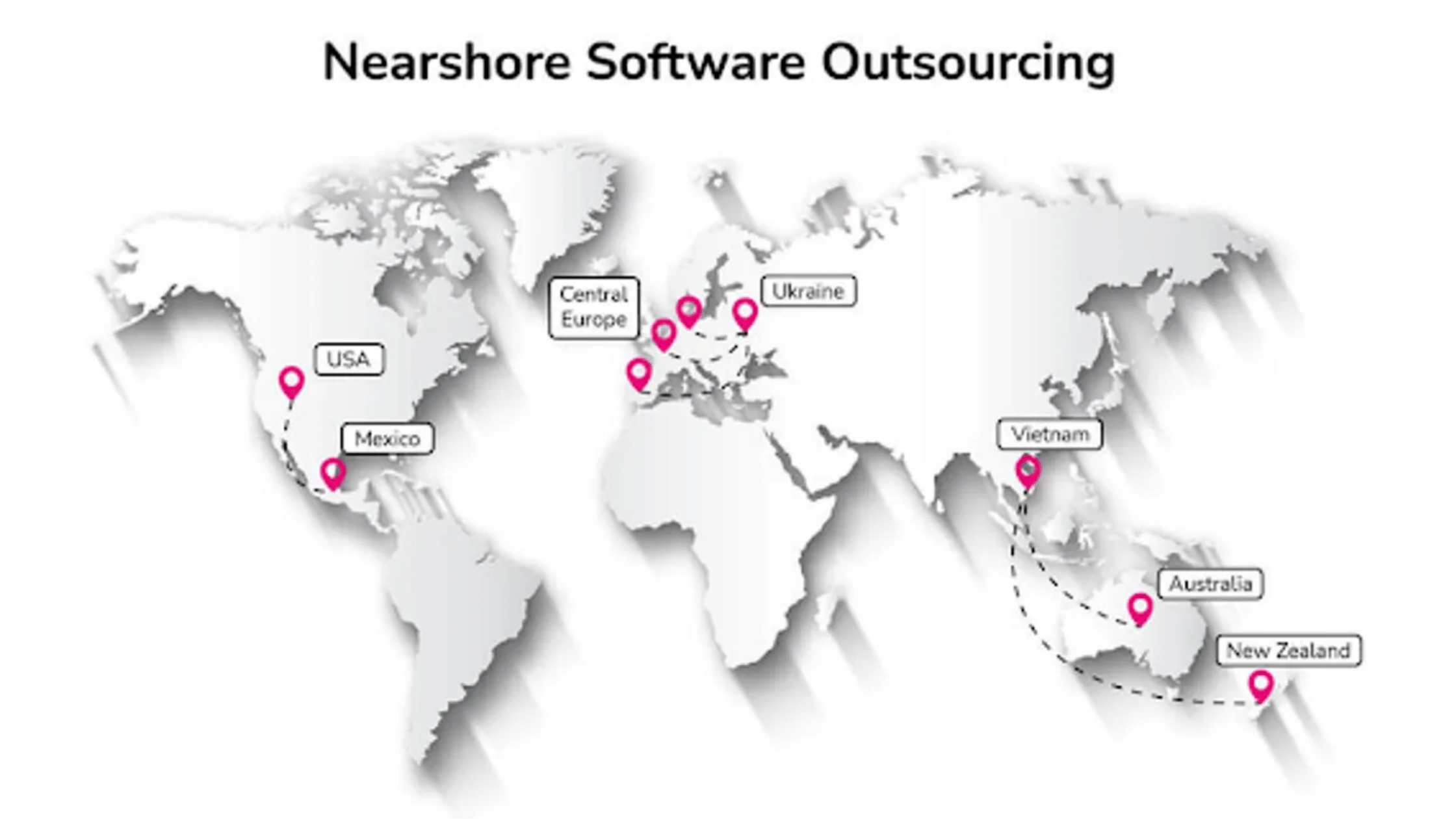 Image Source:
Image Source:
Nearshore developers are software developers or development teams who work in countries that are geographically close to the client’s location. This implies that they can operate within a comparable timeframe and communicate in the identical language and cultural background as their customers.
For example, You live in North America and you have hired on-demand developers from countries such as Mexico, Costa Rica, or Brazil.
- Offshore Developers
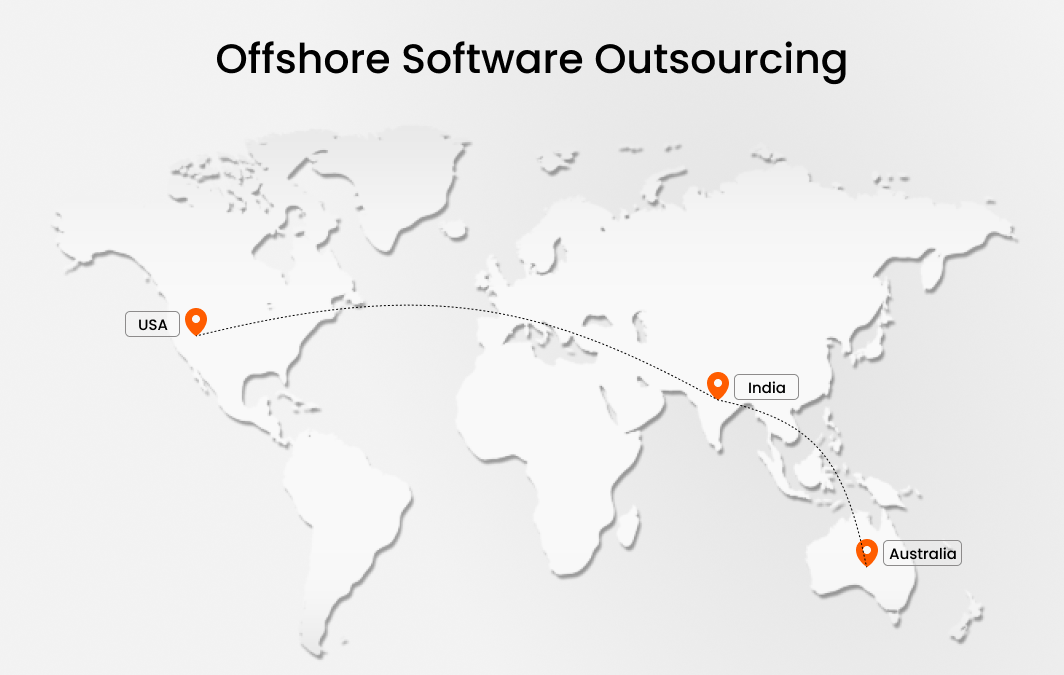
Offshore developers are software developers who work for a company located in a different country.
By outsourcing software development projects to offshore developers, companies can take advantage of lower labor costs in other countries, while still accessing top talent and quality work.
However, there can be challenges with time zone differences, language barriers, and cultural differences that require effective communication and project management to overcome.
For example, you are living in the United States and hire on-demand developers from India or the Philippines.
- Onshore Developers
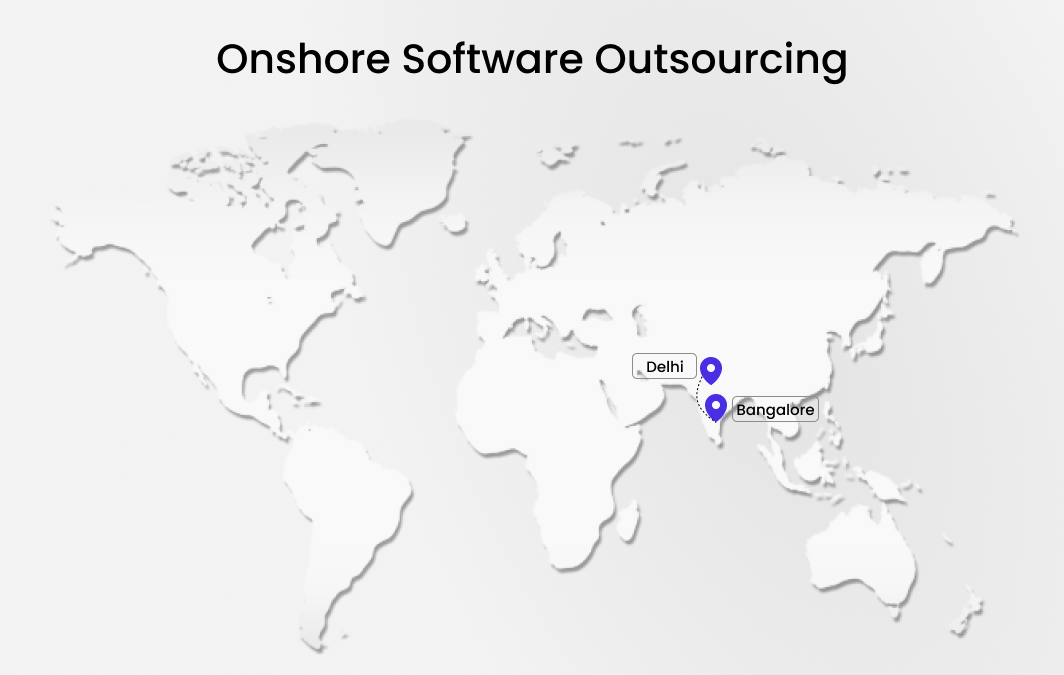
In simple terms, onshore developers are software developers who work within the same country as the company or organization that has hired them.
Many businesses opt for these types of developers as they desire close collaboration with the development team and a higher level of authority over the development procedure. It also eliminates some of the communication and time zone challenges.
For example, if you are an Indian-based company and have hired an on-demand developer from India,
Here’s a comparison table for nearshore, offshore, and onshore developers
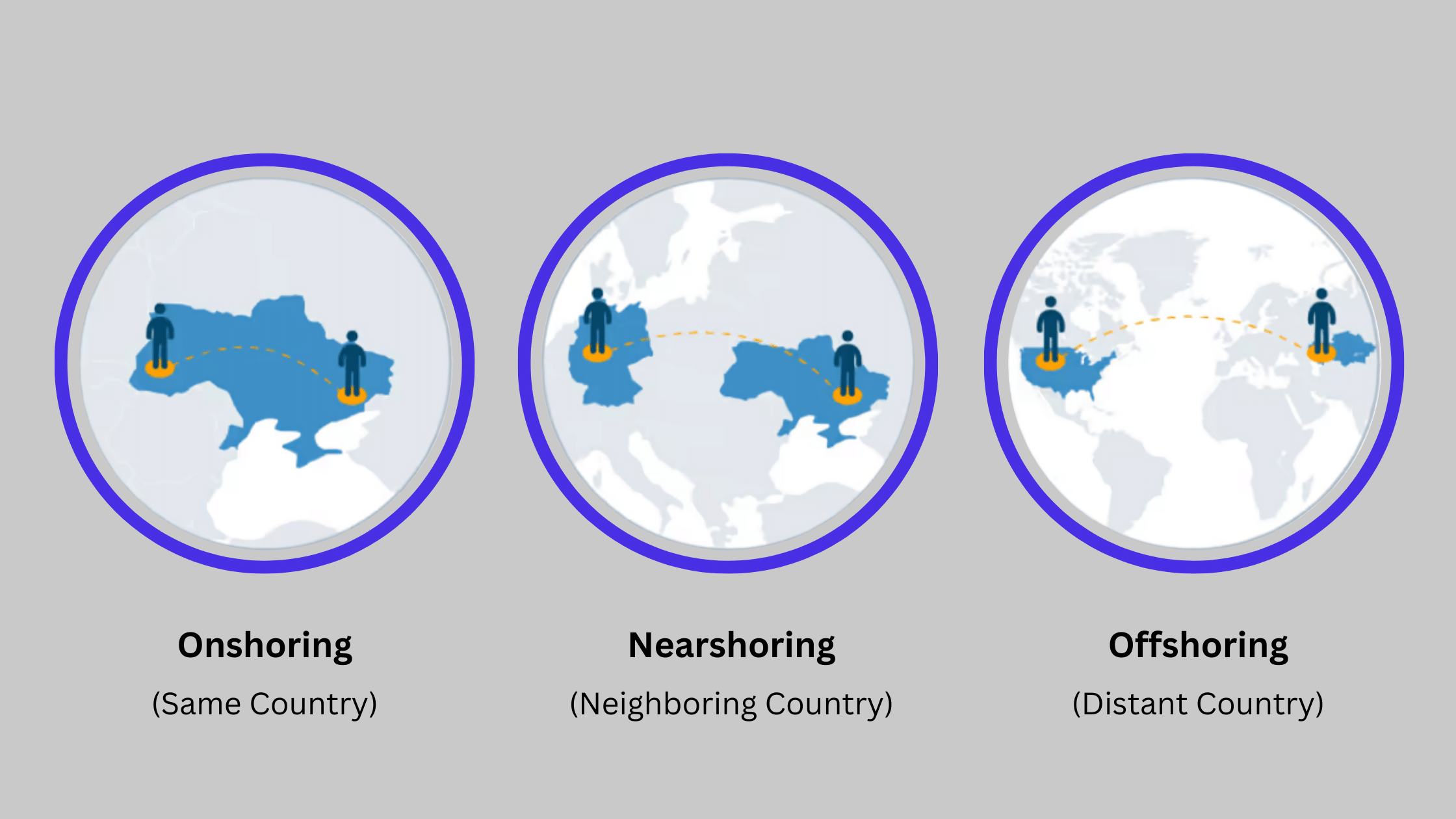
| Nearshore Developers | Offshore Developers | Onshore Developers | |
| Location | Located in a neighboring country or region, typically with a similar time zone or close proximity to the client’s location. | Located in a different country, often in a different time zone and geographically distant from the client’s location. | Located in the same country as the client, usually within the same time zone or a nearby region. |
| Proximity | Offers geographical proximity and cultural similarities, which can facilitate communication and collaboration. | Provides cost-effective options but may require managing potential language and cultural differences. | Allows for easier communication and collaboration due to shared language, culture, and working hours. |
| Cost | Generally offers lower rates compared to onshore developers, but still higher than offshore rates. | Often provides cost-effective solutions with significantly lower rates compared to onshore developers. | Typically has higher rates compared to offshore and nearshore developers due to higher labor costs. |
| Communication | Communication is usually easier due to overlapping working hours and fewer language and cultural barriers. | Communication may require additional effort due to potential language and cultural differences, as well as different working hours. | Communication is generally easier and more seamless due to shared language, culture, and working hours. |
| Time Zone | Time zone differences are typically minimal or non-existent, allowing for real-time collaboration and faster response times. | Significant time zone differences may require adjusted working hours or asynchronous communication. | Time zones are usually aligned, enabling real-time collaboration and quicker communication. |
| Project Control | Offers good project control with frequent interaction and the ability to visit the development team if needed. | Requires effective project management and clear communication to ensure proper coordination and control. | Provides easier project control with direct access to the development team and face-to-face meetings if necessary. |
| Skillset | Nearshore developers often possess a similar skillset and expertise as onshore developers due to geographical proximity and cultural similarities. | Offshore developers may have diverse skillsets and expertise, often specializing in specific technologies or domains. | Onshore developers generally have a wide range of skill sets and expertise similar to the client’s market and industry standards. |
| Legal and Regulatory Compliance | Compliance with legal and regulatory requirements may be easier to ensure due to proximity and potential alignment with similar standards. | May require additional effort to ensure compliance with legal and regulatory requirements in both the client and the offshore location jurisdictions. | Compliance with legal and regulatory requirements is usually straightforward due to operating within the same country’s legal framework. |
Pricing Variations Among Countries To Hire On-Demand Developers
A number of variables, including the cost of living, the availability of qualified developers, and the degree of project complexity, can have a substantial impact on the price of hiring on-demand developers between nations.
Factors that affect pricing
- Cost of living in the country where the developer is based.
- The demand for developers in that country.
- The level of expertise required for the project.
The table below shows a comparison of pricing to hire on-demand developers in different countries, based on their hourly rates:
| Country | Hourly rate |
| United States | $100 – $200 |
| United Kingdom | $80 – $150 |
| India | $20 – $40 |
| Ukraine | $30 – $50 |
| Brazil | $40 – $70 |
| Philippines | $15 – $30 |
Quality Parameters to Check While Hiring On-Demand Developers
When reviewing applications to hire on-demand developers, start by reading through each one thoroughly. Take your time, as hiring on-demand developers is not a decision to be taken in a rush. You have to make sure the one you are going to hire aligns with the requirements that you have outlined for your project.
Pay attention to any red flags, such as a lack of relevant experience or incomplete applications.
If an applicant hasn’t taken the time to fill out their application thoroughly, it’s unlikely that they will put in the effort needed to complete your project to your satisfaction.
Therefore, as you begin to narrow down your list of applicants, here are quality parameters that you can consider while hiring dedicated on-demand developers.
1. Technical Skills:
Did you know? In 2022, software developers worldwide preferred JavaScript and HTML/CSS as the most frequently used programming languages.
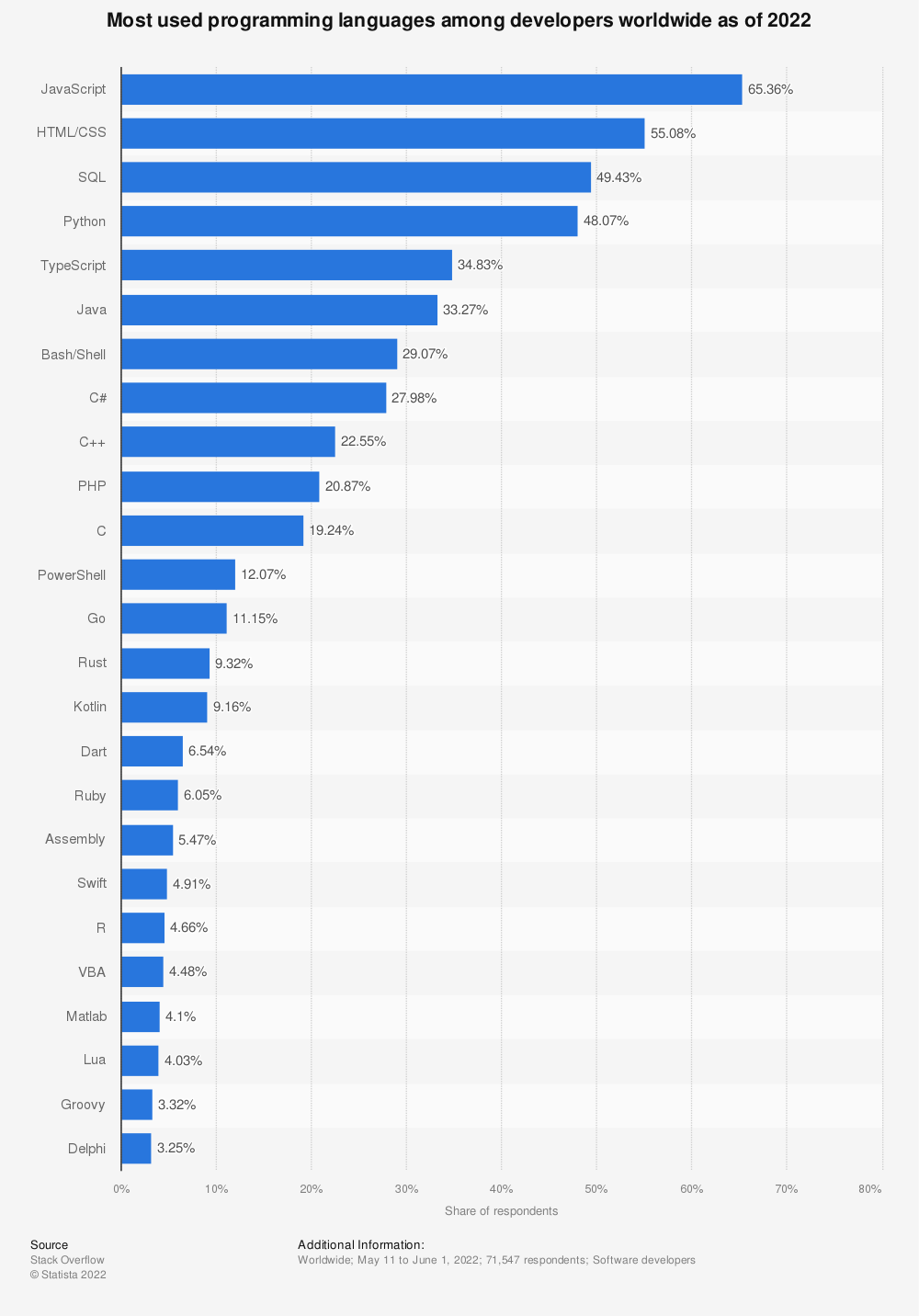
Whether you are developing an Android app, building a website, or creating software, technical skills are of utmost importance. Hire on-demand developers who have experience with specific programming languages such as:
- Kotlin or Java for Android development
- Swift for iOS development
- Angular, React, or Vue for web development
- Node.js, Python, or PHP for backend development.
A technical interview or a coding challenge are two ways to evaluate a developer’s technical proficiency. You may determine from this how well they can solve problems and code, and how well they are accustomed to the tools and programming languages needed for the project.
Key Points:
- Knowledge of relevant programming languages and technologies.
- Familiarity with project management tools and software development methodologies.
2. Communication Skills:
Effective communication is key to a successful collaboration with on-demand developers for hire. Look for developers who can communicate clearly and concisely, both in written and verbal forms. Besides, the investigation discovered that English is legally acknowledged as an official language in 55 nations across the globe. 28.5% of all nations on earth are represented by this.
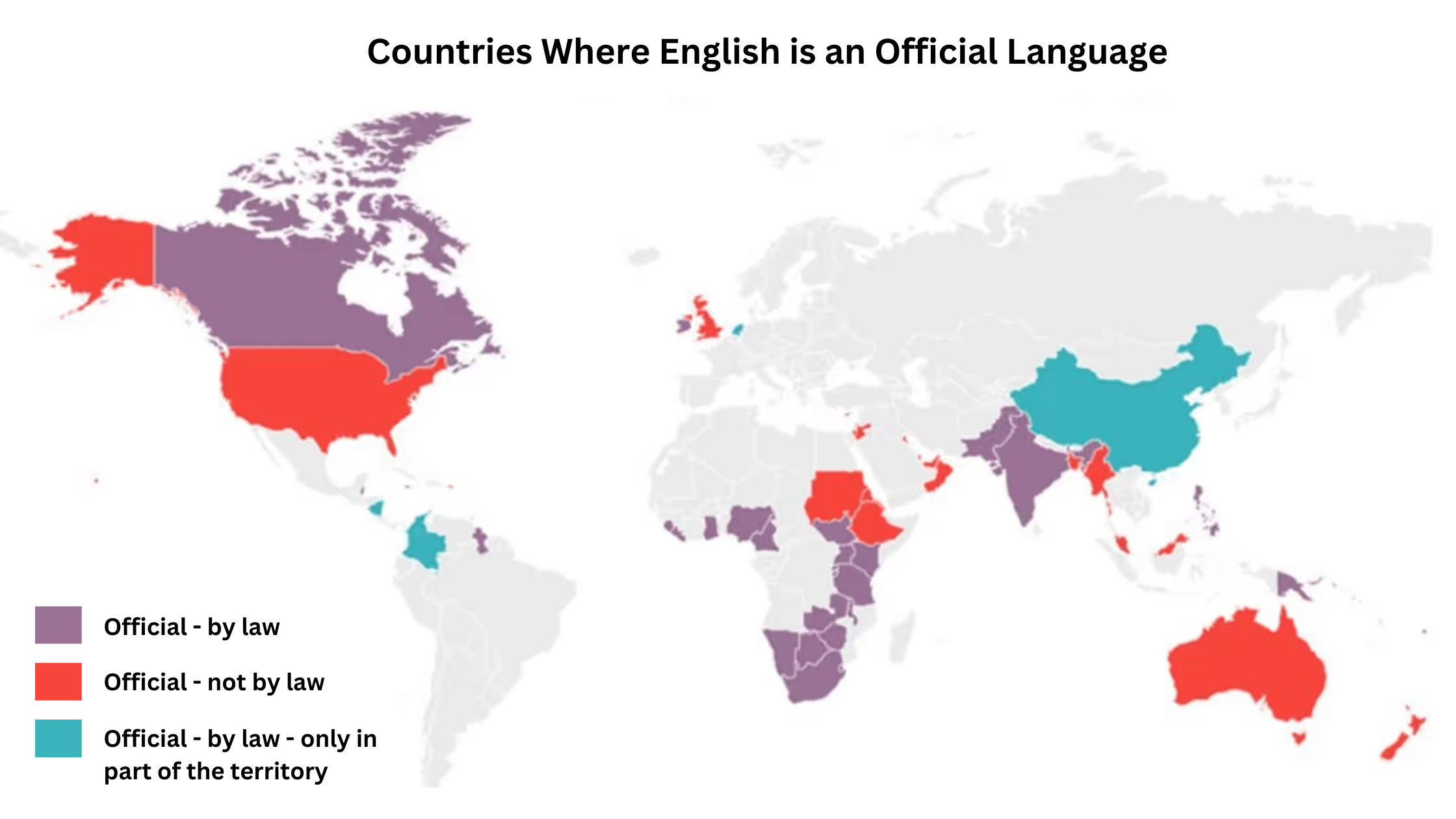 Image Source
Image Source
Therefore, they should be able to articulate their ideas and explain complex technical concepts in a simple and understandable way. Hire on-demand developers who are responsive and proactive in their communication, keeping you updated on their progress and raising any concerns they may have.
3. Experience:
Does the developer just pass out from college? Does the developer have relevant industry experience or just theoretical knowledge? It’s important to examine their prior experience to gauge their ability to deliver quality results. Ask yourself questions such as:
- What kinds of projects have they worked on in the past?
- How long have they been working in the field?
- Do they have any industry certifications or specializations?
- Have they worked with clients or customers in a similar industry or business type?
These types of questions will help you better understand the depth and breadth of their knowledge and skills, allowing you to make a more informed decision when selecting the best on-demand developers for your business. However, there are more than 50% of developers out there have been coding for ten years or less as per the Stack Overflow Survey.
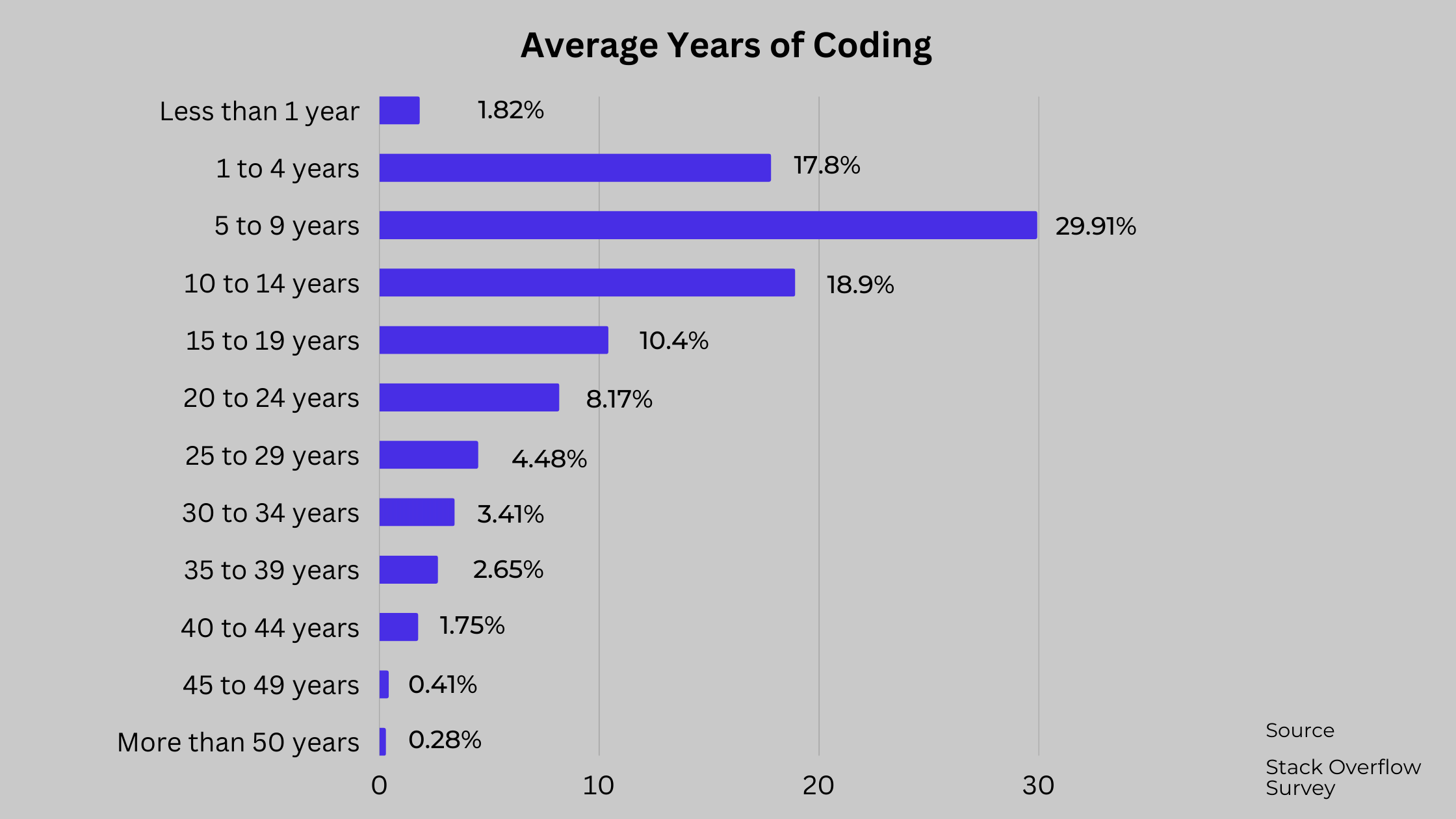 Image Source: Stack Overflow Survey
Image Source: Stack Overflow Survey
The key takeaway here is to not simply hire developers who have passed out of college but to focus on their practical experience in the industry. This can help ensure that they can deliver quality work that meets your business needs and goals.
4. Portfolio and References:
The developer’s portfolio is possibly the most crucial resource you can utilize to judge the caliber of their work. You can view their previous projects by looking through their portfolio. You should look for a diverse range of projects that showcase their:
- Technical expertise
- Design skills
- Coding skills
- Ability to meet client specifications.
Apart from evaluating their portfolio, it’s also crucial to check their references. By talking to their previous clients, you can learn more about their work ethics, communication skills, and their ability to meet deadlines. References can also provide you with information about their ability to work in a team, willingness to take on new challenges, and other important traits.
5. Work Culture:
Work culture refers to the values, beliefs, and practices that define how work is done within a particular organization. A positive work culture can help drive productivity, encourage collaboration, and foster innovation.
Conversely, a toxic work culture can create an environment where employees are demotivated, communication is poor, and the overall quality of work suffers.
So, how do you evaluate the work culture of on-demand developers before hiring them? Here are some parameters to consider:
6. Collaborative Skills:
Developers don’t work in a vacuum. Other team members, like designers, project managers, and quality assurance specialists, have to work together. Look for candidates who have experience working collaboratively and can demonstrate effective teamwork.
7. Work/Life Balance:
Maintaining a healthy work/life balance is crucial in the tech industry to prevent burnout, which is a prevalent issue among developers. Ask candidates about their work habits, their approach to managing deadlines, and their ability to take breaks.
8. Professionalism:
Professionalism encompasses everything from how developers present themselves to how they handle conflict. Look for candidates who are punctual, respectful, and can work under pressure without losing their cool.
After considering these factors, weigh the pros and cons of each developer. Keep the lines of communication open throughout the project to ensure its success. With the right on-demand developer, your project can be a great success.
How to Interview a Company to Hire On-Demand Developers
“As a business owner or manager, you know that hiring the wrong person is the most costly mistake you can make.”
Brian Tracy
When setting up interviews, be sure to communicate clearly and professionally. Before we even think about getting started with the interview, we simply must inform those interviewees of the timetable.
- We need to establish the appointment date and time. And – don’t forget to include the method of the interview ( will it be face-to-face, over the phone, or via video conferencing)
- For remote interviews, ensure that you have all the necessary tools and software ready before the interview.
Note: Bear in mind that the interview is a communication between two parties.
Follow these three simple steps to guarantee a successful interview:
Step 1: Asking the right questions
During the interview, ask questions that will help you gain insight into the candidate’s abilities, expertise, work principles, and communication style. Inquire about their past projects, how they handled challenging situations, and what they can contribute to your project.
The developer is also assessing whether they want to work with you and your project. So, be sure to discuss the project vision, your expectations, and the working arrangement (whether it’s a one-time project or an ongoing engagement).
However, here are some of the common questions that can be asked while interviewing a company to hire your dedicated on-demand developers.
- How do you ensure that the developers you assign to our project have the necessary technical skills and experience?
- What is your communication strategy during the project?
- What is your experience in working remotely with clients?
- What procedures do you take to make sure your developers stick to schedules and deliver high-caliber work?
- What is your process for handling disagreements or misunderstandings between your team and ours?
You can assess a company’s capacity to meet your needs and make sure your project is successful by asking them these questions.
Step 2: Evaluating their responses
When a company representative answers your questions, listen carefully and evaluate their responses.
- Are they delivering them with confidence and passion?
- Do they show a deep understanding of your needs and requirements?
Use your intuition to pick up on subtle cues that could indicate if the company is the right fit for your on-demand developer needs.
Step 3: Making the final decision
It’s crunch time, and it’s up to you to pick the one developer or development team that will bring the goods, pack a punch, and deliver on-demand magic. Don’t rush to a decision but keep in mind the qualifications, experience, and expertise of each developer, coupled with their approach to work, communication skills, and how well they meet your overall company needs.
The bottom line is you want the right team, not a revolving door of subcontractors or someone who only knows how to whip up spaghetti code. Do your homework, be thorough in your evaluation, and find that diamond in the rough that will be the missing piece in your on-demand software puzzle.
Assessment Process to Hire an On-Demand Developer
After the interview process, you should create an assessment plan to evaluate the candidates you’re considering.
- Create a plan:
Start with what skills and qualifications you are looking for in an on-demand developer. It is of utmost importance to possess vast knowledge and expertise in multiple technical aspects, such as programming languages, frameworks, and databases, alongside exemplary communication and teamwork skills. Determine the level of experience and expertise required for the project or job
- Technical Assessment:
When engaging with on-demand developers, it is vital to gauge their technical proficiencies to make certain that they possess the capability to accomplish the tasks needed for the job. This can include coding tests, problem-solving exercises, or technical interviews.
- Cultural Assessment:
Evaluate the candidate’s fit within your company culture. This can include assessing their communication skills, teamwork abilities, and work ethic.
- Final Decision:
After assessing the candidate’s technical and cultural fit, make a final decision based on the overall fit for the project and your team.
Best Practices for Hiring an On-Demand and Remote Developer
How do you determine if someone is a team player or has the ability to take constructive feedback?
The answer lies in adopting a systematic approach and good practices for identifying potentially qualified candidates. Below, we have discussed the right approach that can streamline and increase the efficiency of your entire recruiting process.
- Establish clear communication:
How do you ensure a remote developer knows what you’re thinking? Is there a telepathic channel to transmit your thoughts? Well, it turns out that communication is more effective when it’s established with precision and clarity.
It is important to have seamless communication with your on-demand and remote developers. Who wants to be lost in translation with a development project? A succinct explanation of your work is preferable so that you don’t face difficulties due to mistakes and bugs.
- Set realistic expectations:
By laying down clear guidelines and timelines, you’ll avoid delays and any unfortunate eye rolls when asking about progress.
Besides, set achievable goals and timelines that take into account your developer’s skill set, work style, and availability.
- Use the right tools and platforms:
Effective communication and collaboration are essential when working with a highly skilled on-demand software developer. Failure to establish these channels will result in a coding nightmare. To ensure success, it is crucial to select appropriate platforms and tools for communication and collaboration.
There are various collaboration tools and project management software you can opt for, like Zoom, Microsoft Teams, Jira, Slack, Dropbox, etc., to keep everyone connected and informed throughout the development process.
- Ensure a good working relationship:
Working with a remote developer can be tricky and stressful. That’s why a healthy work relationship should be your priority. When you hire on-demand developers, treat them like human beings (we’re all the same on the inside!), establish mutual respect, and be friendly.
By doing this, you’ll be rewarded with loyalty, commitment, and quality work. Show your appreciation through fair pay, prompt feedback, and support when needed.
FAQs
Q1: What is the best way to hire dedicated developers?
Just follow the below quick tips:
Tip 1: Identify your Business Needs
Tip 2: Hire a dedicated developer from the right platform.
Tip 3: Check the domain knowledge of the developer
Tip 4: Look for communication skills.
Tip 5: Security and NDA to consider while hiring dedicated developers.
Tip 6: Pricing and Budgeting.
Q2: How do I hire on-demand developers for my startup?
To hire on-demand developers for your startup, follow these steps:
Step 1: Define your project requirements and timeline.
Step 2: Research and shortlist reliable on-demand developer platforms.
Step 3: Analyze the developer’s portfolio and feedback from previous clients.
Step 4: Conduct an interview to assess their skills and experience.
Step 5: Sign a contract or agreement detailing the project’s terms and conditions.
Q3: What things to keep in mind while hiring on-demand developers?
While hiring on-demand developers, consider the following things:
- Technical Expertise
- Communication Skills
- Availability and Flexibility
- Project Management Skills
- Cultural Fit
Q4: How much will it cost to hire on-demand developers?
Well, that completely depends on your project requirements. However, the hiring of software developers in India starts from $15 an hour.
Q5: When should I hire a dedicated developer?
You can consider reaching out to reputed software outsourcing companies in India that offer on-demand developers for hire like ours. Besides, it is recommended to hire a dedicated developer when you have a long-term project or ongoing development needs.
A dedicated developer can provide consistency and stability to your development team, ensuring that your project is completed on time and within budget.



![blockchain beyond cryptocurrency - trends in android app development [2024]](https://www.scalacode.com/wp-content/uploads/2024/01/blockchain-beyond-cryptocurrency-trends-in-android-app-development-2024-1.png)